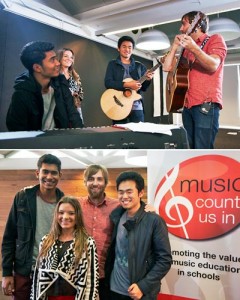Today an estimated 600,000 schoolchildren will sing out simultaneously for more music education in schools.
Year 12 student Ryan Chelva, the co-composer of the song they’ll sing, will quietly support them as he sits for his HSC.
Ryan is a student at Victoria’s Heathdale Christian College. Ironically, his school isn’t participating in the exercise, but students and teachers nationwide will unite in singing the song, “Different People (Stand Together)”.
The nationwide chorus under the banner Music: Count Us In (MCUI) is scheduled for 12.30pm EDT at public places all across the country. Education Minister Peter Garrett, and 1800 schoolchildren, will be at the concluding event outside Parliament House.
 This is the fifth year running for MCUI, aimed at drawing attention to the value of music education to students’ development. It began in response to a national review, and the ensuing 2005 Seares Report, which raised alarm bells about the decline of music education in schools.
This is the fifth year running for MCUI, aimed at drawing attention to the value of music education to students’ development. It began in response to a national review, and the ensuing 2005 Seares Report, which raised alarm bells about the decline of music education in schools.
Every year a new song is selected, and participating schools practice on their own with free materials provided on the MCUI website. When the call went out for 2012 submissions, Ryan sent in his song idea. Program Ambassador John Foreman says that three were shortlisted out of 80 submissions. Ryan and the two other young songwriters then met with songwriting mentor Josh Pyke, to work from scratch on this year’s program song.
MCUI, run by the Music Council of Australia (MCA), wants to underscore that music is central to every student’s education. Campaign Director Tina Broad says that decades ago, primary school teachers had to be able to play a musical instrument. Asked whether that should still be a criterion, she replied emphatically, “It should be.”
The MCA says music is now one of the poorest-served subjects in most government schools, particularly in primary schools. MCA research shows that overall around Australia, just 23 percent of government schools are able to provide students a meaningful music education, compared with 88 percent of private schools.
Picton school teacher Tim French says that great emphasis is placed on literacy and numeracy, but that teaching music is just as important and should be part of a whole school approach. “As a music teacher I also teach literacy and numeracy; I teach mathematics when children work out rhythms and count the beats… I say words that English teachers would have difficulty spelling, but which the children know!”
He calls for a more equitable emphasis on the subjects taught in schools. “When we make some subjects compulsory, but music an option, we’re passively saying that some subjects are important and some are not.”
Today, when thousands of young voices unite in song, it will be a call to policy-makers, politicians, parents and school principals to make music a vital part of the school day.
Email This Story
Why not send this to a friend?
